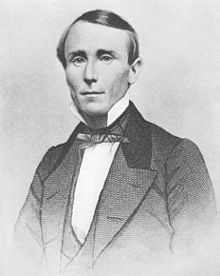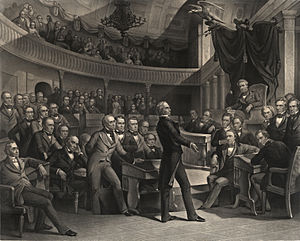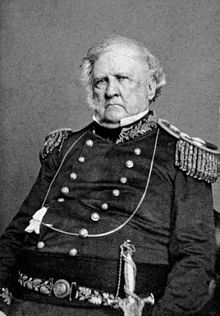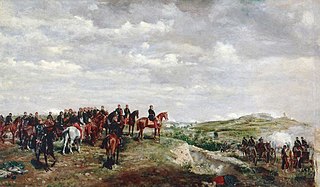Chapter 51 The Webster Administration
"I do not like slavery but that does not mean I have to go against it. With the existence of Texas, the south will try and find new ways of spreading their practice or else they will demand total legalization and tear the Union apart over the issue. Sometimes the lesser of two evils need to be supported to prevent the rise of the third."- President Daniel Webster 1850
"It seems like those Yankees are getting all angsty about their usage of slavery. You don't think that will ever happen to us, right?"- President David Burnet 1852
"I would've never thought that Stephen would actually become the President. I guess pigs do fly."- Abraham Lincoln 1853
Much like the Burnet Presidency in Texas, the Webster administration could be said to be one of a transitional presidency between two different eras, though this process would be met with a higher amount of conflict and division then their Texan counterparts. This was officially known as the end of the Whig Era and the beginning of the pre-Civil War troubles that would come to plague the nation so much in the next decade. When Daniel Webster came into office he came in with an America that was highly unified and still celebrating the success of the Oregon War which just managed to gain them permanent access to the Pacific and a new continental ally. The celebrations would last for a year or so before the feeling of euphoria died down and the men of congress, specifically those of southern origin, put their minds to work on the topic of Oregon and realized one huge fundamental problem that was about to occur. With the existence of Texas having taken up most of whatever land was left south of the Missouri Compromise besides the future states of Seqouyah and Bahamas, there was no new room for the spread of slavery and pretty soon Oregon along with other potential states such as Minnesota were bound to join the Union and give the North a greater vote in both the house, and most importantly the Senate where the southerners traditionally dominated. It is also important to remember that the North-South divide was formed on more than just the basis of slavery, with two entirely different nations seeming to form with the clash of Yankee/Dixie culture, the division over the correct form of economic growth, differing views on foreign affairs, etc. The problem could have been solved with the annexation of Texas, but when a southern representative sent a note to President Burnet on the topic, Burnet replied that he would sooner see hell freeze over then have Texas join the Union. Thus, the road to Fort Sumter was about to begin.
The first priority in domestic affairs for President Webster was immediate recovery from the Oregon War and the management of America's new possessions with the addition of Oregon. His main goal in his first 100 days in office was to work with congress to create legislature which would implement infrastructure improvements in the states which had become battlegrounds in the war and would give subsidies to certain sections of the economy which had suffered the most in the war such as the Northern textile mills or the Southern cotton trade. The collection of bills had received a huge amount of bipartisan and sectional support as they were equal in distribution to those affected such as New York and Alabama, while was implemented more towards improving the United States as a whole rather than certain areas. Another action taken was to use the Bank of the United States to give out multiple loans to small businesses, large urban companies, and rural farmers to help them get back on their feet after thee economic losses of the past decade. This type of federal intervention would finally show that the Whig doctrine of centralized banks and national management of the economy could be successful, later leading it to become on of the tenets of the early Republican party. Another major aspect of the economy was to continue to raise high tariffs on European goods so that the New England and Great Lakes regions could maintain a monopoly on American goods and sell any exports left to Central Europe. The policy worked for a time as Europe was currently in a rebuilding process and wasn't able to compete directly with the United States for a few years. It did lead to higher sectional tensions though as Southerners complained about the high prices for domestic goods instead of relying on a free trade relationship with a European state like Texas did with France. President Webster also decided to follow Lamar and Burnet's actions and invested a high amount of the federal budget to the creation of railways, canals, roads, and bridges to speed up trade across the nation and connect Western America to the states East of the Mississippi. Overall these economic measures would be mostly successful and bring the American economy to a period of steady growth by the end of Webster's Presidency, though the debt continued to increase. On the matter of what to do with Oregon, Webster decided to split it up into two separate territories, the Oregon territory and the Columbia territory, both of which were a reflection of the old British/American division by the 49th parallel. Another addition to the U.S would be the consolidation of the Bahamas into the Bahamas territory. With the California Gold Rush ongoing in Texas, new settlement societies were created with Federal backing to settle Oregon so that it could become the nation's pacific trade nexus and that further gold in the region could be discovered, though gold wouldn't be found until the mid 1860's which would further prompt the Alaska Purchase. In other terms of organization, President Webster also decided to transform the protectorate of Liberia into an official American colony. The Oregon War had proven that the place was lightly defended and the fact that most of the Independence supporters had been killed in the conflict also left the territory highly disorganized. To solve the problem a battalion of marines were sent under the command of Lieutenant Colonel Vince Downing along with a squadron of U.S Navy ships. Webster's main reason to keep the colony was to have an staging point should Africa ever prove profitable and keep a land in which freed slaves may be exported. These actions would later result in the creation of the modern American Africa. Finally with the U.S military some reforms were to be enacted in order to keep the nation in a better state of preparation for war. The size of the army would be further expanded to 50,000 men in peacetime while the navy would increase to 100 ships, with the creation of a Pacific squadron to protect Oregon. While Webster's domestic situation could be called good, there was one issue that would divide the nation and tarnish Webster's legacy, slavery.


Modern Day Boston, Oregon (Right) Liberia, the first colony of American Africa (Left)
By the end of the Oregon War the slave/free state divide was at a precarious balance with 15 free states and 14 slave states. While the Oregon War had been fought in retaliation for the loss of American lives and the right to expand to the Pacific, all of the territory that had been gained were north of the Missouri Compromise line. While slavery wasn't the main issue of divide, it was one of the driving forces behind sectionalism and the legalization of slavery was one of the beginnings of a wedge in America that created the Yankee and Dixie culture. The only reason the south had survived now was because of the chance of a swing vote in the senate with the northern Democrats. These prospects were looking highly bleak though as Oregon was being pushed to enter the Union soon and Minnesota was the next territory bound to become a state afterwords. If the south took no action soon then decades could go by and they would be outnumbered both in the house and the senate. The situation was looking worse with little prospects of another addition. Texas had repeatedly rejected annexation since Lamar took office and had no reason to do so now with the discovery of gold. If the United States went to war to annex Texas then they would face a huge amount of opposition domestically and the prospect of going to war against France. Cuba was always a popular choice but Spain considered the island as its own province and refused to sell it. Filibusters were a continuous failure and the United States was no shape to get into war again so soon with a European power, even if it was France. Going to war with Spain also brought the risk of enticing conflict with Britain again as they had cooperated with the Spanish in the past (even though 1852 would've been a perfect time with the Crimean War). Haiti was an absolute impossibility as the nation solely existed because of a successful slave revolution. If the United States tried to annex it then it would face an intense guerilla warfare and self-implosion from opposition in the North. Thus an high amount of opposition was laid out against the entry of Oregon to the Union, it even got to the point where a group of southern senators signed a declaration that they would never support the entry of Oregon. Thus by Webster's last year in office, Oregon was still put on hold for admission while congress was wracked with conflict over the issue.
A solution was then presented by Clay, called the Oregon Compromise, which was created with the intent of admitting Oregon and solving several issues on the nature of slavery in the Union. The bill was a rather comprehensive document but it can be summed into five pars. First, Oregon would be admitted to the Union as a free state with the eastern half of the territory being split to create the Washington territory. Second,the Missouri Compromise line would move up north to match the latitude of Missouri's northern border, congress would then recognize all territories north of it to have slavery banned. Third, the slave trade would be banned in the District of Columbia (though slavery would still be legal). Fourth, the fugitive slave act would be enacted which would force an escaped slave to return to their owner and would legally allow the owner to punish them however they saw fit. Fifth, support would be taken to fund a colonization society for the Bahamas in order to turn it into a state. To say that the reaction to the Oregon Compromise was divisive was quite the understatement. The bill only passed with a one vote majority in the house and in the senate it had to be reached out of deadlock with the actions of Vice President Millard Fillmore who decided to vote in favor of it. Somewhat of an ominous event happened on the day of the bills passing, May 10th when Senator Henry Clay suddenly died of tuberculosis, a sign which was taken by abolitionists as God's wrath and one that was accepted by the general public as the end of the old age of compromise. All around the north protests erupted due to what was perceived as a betrayal of the old order by congress. When the Fugitive Slave Law was enacted many northerners also chose to ignore it entirely, leading to the creation of the Underground Railroad. In the south the people celebrated over the fact that their "way of life" was protected and they had managed to achieve multiple victories with the popular sovereignty of new territories and the Fugitive Slave act. Another surprising outcome of the bill was the immense southern support for the Bahamas statehood movement where hundreds of thousands of dollars where being poured in to support the project and an estimated 50,000 southerners had migrated to the islands over the next five years, allowing the archipelago to become a state in 1856.
What was the worst outcome though were the divisions in the Whig party that had resulted. While many Democrats were divided over the issue they for the most part stuck together with the Northern Democrats relying on popular sovereignty as a compromise. With the Whigs however, infighting erupted with a majority of the party decrying Webster and Fillmore as traitors to the party and the righteous cause of abolition. Despite the presidents multiple accomplishments domestically, the Whigs saw the passing of the Oregon Compromise as a total abandonment of their parties principles. Even though attempts were made by President Harrison to show support to Webster and unite the party together, the divide still worsened and Webster refused to give up his pragmatism and try and veto the law or help create a better deal for the North. This would soon be regarded as the beginning of the end of the Whigs, and the rise of the Republicans.
The Oregon Compromise
In terms of foreign affairs during the Webster administration, the United States much like Texas, chose to keep their policy of neutrality at the time and refused to become involved in the Crimean War or the Sardinian Heresy. The main foreign developments that the United States had to deal with at this point were mostly within the Americas. During this time, the United States policy of total neutrality would be abandoned as they began to develop its relation with Quebec, a precursor to the Lee Doctrine. Trade between both the United States and Quebec would intensify due to the free trade agreement as New England was able to quickly transport its manufactured products to Quebec while it received in turn a good quantity of natural resources from the northern republic. The U.S Army was also valuable to Quebec as they were able to intervene and help quell some minor insurrections that took place in New Brunswick/Nova Scota (now called Arcadia) which erupted from the remaining English colonists. As a result of the friendly relationship with Quebec, the amount of French speakers within the North grew in a large manner at this time and opinions of Catholics, such as the gigantic wave of Irish immigrants, had improved in a significant manner at this time. The economic investment from New York and New England would be extremely important for Quebec as it helped the nation gain financial stability in its early years. During Webster's presidency, relations with Texas were starting to improve greatly as the old conflicts of the annexation attempts died down and investments were being made to connect Texas to Louisiana with the growth of the East Texas railroads. American goods were also being sold in great amounts in California while Oregon was still developing its port cities of Boston and Seattle. The growth of the Northern Industry was also very significant in Latin America with American goods now being able to compete with Europe in the region in terms of both quantity and quality. The main trade partners with America in the region would come to be Yucatan, Columbia, Brazil, and and Venezuela. Latin America was also the site of much conflict though as multiple filibusters were undertaken by southerners to claim Cuba and Haiti as American territories as mentioned previously. The Walker expeditions, named after filibuster William Walker, were multiple attempted raids by Americans, primarily by Florida, into Cuba and Haiti. All of them were failures with the invasions met with fierce resistance by the Spanish, and the Haitians respectively. They only resulted in soured relations with Spain overall and multiple warscares that would take place between the two nations during Webster's and Douglas's term. Though actual war would not come until two decades later with the Spanish-American War.


William Walker America's most infamous filibuster (Right) Filibusters in Cuba (Left)
The 1852 Presidential Election was quite a troublesome affair that was only overshadowed by Bleeding Kansas and the 1860 Election which led to the Civil War. On the Democrats side, the process was rather calm as the party came together united in order to end the Whigs hold on the White House and gain complete control of Congress. The main division that took place in the Democratic Party was whether or not to push slavery completely, as advocated by the south, or to compromise and use popular sovereignty. Eventually a compromise ticket came about where the party would rally upon young and upcoming Senator Stephen Douglass from Illinois, an active Senator in Washington who was a key force behind the passing of the Oregon Compromise and was a proponent of popular sovereignty for all of America. Douglas was seen as a centrist candidate who could unite the whole party and could pass multiple legislation in a manner similar to Henry Clay. His running mate was Georgian representative Robert Toombs, a name which would live in infamy after the beginning of the Civil War. On the Whig side was something that could only be called organized chaos. When the Whig Party convened they were greatly divided between the candidacies of Daniel Webster and war hero Winfield Scott. The split came about from Webster's support of the Oregon Compromise with the Northern pragmatists moving to support Webster while the Northern Abolitionists and the Southern Whigs went for Scott. The convention became deadlocked and it took a whole week of arguing between the party until anything could get done, a period which involved much heated arguments and even some fisticuffs. The Convention came to an end on June 24th when representative Abraham Lincoln led the remaining pragmatists and compromisers to support the President, highlighting his domestic achievements and relative successful handling of foreign affairs. When the final ballots were called Webster received 150 votes while Scott had 146. This was an total outrage to Webster's opponents who then decided to put Scott on a Third Party platform called the Union party, with running mate William A. Graham. Webster's chances of winning were also worsened with the emergence of the Free Soil Party which was dedicated to abolishing slavery entirely, with the candidacy of John P. Hale. The summer and autumn of 1852 saw much conflict as the Whigs mostly focused on attacking each other with Webster running intense smear campaigns against Scott for what was seen a a betrayal against the party. Pro and Anti-Slavery forces would also clash out with the most violent fights happening in the border states, something which resulted into a full fledged riot with the Kansas City Riots of 1852. During this time Stephen Douglas traveled across the country and presented himself as a candidate of compromise who could help heal the divisions that had taken place in the country. Indeed during the Columbus Presidential Debate, Douglas was the only candidate who acted in a rational manner while Webster and Scott openly attacked each other during their speaking times while Hale decried Douglas as an disciple of Satan which had been sent from hell to keep the negro enslaved. Douglas took his time to promote the platform of the Democratic party and also supported the continuation of America's economic growth while decreasing regulation and lowering tariffs. Come the election the South would support Douglas full heartily with the exception of Kentucky and Tennessee who went to Scott. The North was a split between Webster and Douglas with New York and New England going for Webster while Douglas received the rest. It was fortunate that Douglas managed to receive a majority or else the vote would go to the House where it was estimated an bloody struggle would take place, though most Historians theorize that Douglas would have won on an early ballot anyways. Months later Douglas was inaugurated into office with a bitter Webster leaving Washington (though developing a fierce hatred of Scott rather than Douglas) while Abraham Lincoln was able to gain Douglas's Senate seat in the special election. With the incoming of the Douglas Administration began the true disintegration of America over the topic of slavery which would define Douglas's entire presidency. Meanwhile, the Whig Party had gone on an irreversible course due to the election and soon disbanded in 1854, with its remnants soon forming the Republican Party.
1852 United States Presidential Election
Douglas/Toombs (D): 193 EV 1,510,354 Votes 45.16%
Webster/Filmore (W): 76 EV 1,067,981 Votes 31.93%
Scott/Graham (U): 24 EV 765,430 Votes 22.91%








